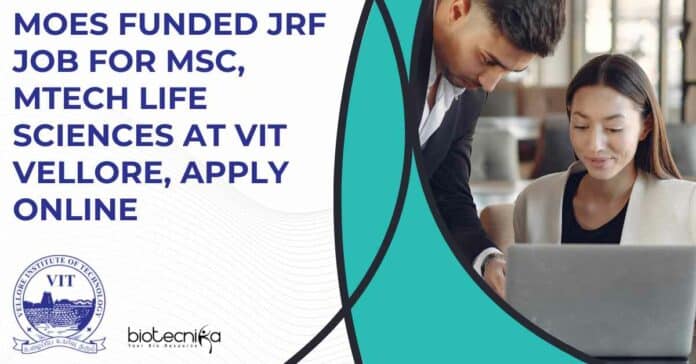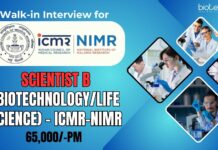VIT Vellore JRF 2023 Job Opening For MSc, MTech Life Sciences
VIT Vellore JRF 2023 Job Opening For MSc, MTech Life Sciences. VIT Vellore MSc & MTech Life Sciences Junior Research Fellow job opening. Interested and eligible applicants can check out all of the details on the same below
This job expires in
Applications are invited for the post of Junior Research Fellow (JRF) for a Ministry of Earth Sciences (MOES), Government of India funded project entitled in the, Centre for Nano Biotechnology (CNBT), Vellore Institute of Technology (VIT).
Position: Junior Research Fellow (JRF)
No. of Positions: 1
Title of the Project: “Ecotoxicological studies of micro & nano plastics, on its vectorization of other pollutants and synergistic impact of nanoplaslics and ocean acidification-A microcosm approach”
Duration: 3 years
Sponsoring Agency: Ministry of Earth Sciences
Principal Investigator: Prof. Dr. Natarajan Chandrasekaran, Senior Professor, Centre for Nanobiotechnology (CNBT), Vellore Institute of Technology (VIT), Vellore – 632 014
Co-Principal Investigator: Prof. Dr. Amitava Mukherjee, Senior Professor & Director Centre for Nanobiotechnology (CNBT) Vellore Institute of Technology (VIT) Vellore 632 014, Tamil Nadu.
Co-Principal Investigator: Prof. Dr. T.B. Sridharan, Senior Professor & Controller of Examinations School of Biosciences and Technology (SBST) Vellore Institute of Technology (VIT
) Vellore 632 01How to Apply:
Send your resume along with relevant documents pertaining to the details of qualifications, scientific accomplishments, experience (if any) and latest passport size photo, etc. on or before (30/08/2023) through online http://careers.vit.ac.in.
- No TA and DA will be paid for appearing in the interview.
- Shortlisted candidates will be called for an interview at a later date, which will be intimated by email.
- The selected candidate will be expected to join at the earliest.
Qualification: M.Sc/M.tech in Life/Chemical Sciences
Desirable (if any): Prior experience in handling micro and nanoplastics, knowledge in setting up microcosm, water chemistry, field sampling strategies.
Skills Required: Prior experience in handling micro and nanoplastics, knowledge in setting up microcosm, water chemistry, field sampling strategies.
Stipend: Rs. 20,000/ + HRA – per month (three years).
Here are 5 possible interview questions along with their answers based on the provided job description:
Question 1: Can you briefly explain the focus of the project “Ecotoxicological studies of micro & nano plastics, on its vectorization of other pollutants and synergistic impact of nanoplastics and ocean acidification-A microcosm approach”? Answer: The project aims to investigate the ecotoxicological effects of micro and nano plastics, their role in transporting other pollutants, and their combined impact with ocean acidification using a microcosm approach.
Question 2: What motivated you to apply for the Junior Research Fellow position in the Centre for Nano Biotechnology at VIT for this specific project? Answer: I am highly interested in environmental research, and this project’s focus on studying the effects of micro and nano plastics aligns perfectly with my academic background and passion for contributing to sustainable solutions for environmental challenges.
Question 3: Could you elaborate on your prior experience in handling micro and nanoplastics? How does this experience make you suitable for this research project? Answer: During my academic journey, I have been involved in research projects that required hands-on experience in handling micro and nanoplastics. This experience has provided me with insights into their behavior and effects, which will be invaluable for contributing effectively to this project.
Question 4: The project involves setting up microcosms and water chemistry analysis. Can you share an example from your past experience where you successfully set up a microcosm for research purposes? Answer: During my postgraduate studies, I was part of a team that established a microcosm to simulate aquatic ecosystems. We carefully monitored and controlled various parameters to create a realistic environment, which enabled us to conduct meaningful research on pollutant interactions.
Question 5: The project emphasizes a multidisciplinary approach. How have your academic and research experiences prepared you to collaborate effectively with colleagues from different scientific backgrounds? Answer: Throughout my academic journey, I have collaborated on projects that required interdisciplinary teamwork. Whether it was coordinating with chemists for water analysis or collaborating with biologists for sample collection, I have developed strong communication and adaptability skills that are crucial for successful multidisciplinary collaborations.
Remember, these answers are just suggestions, and you should tailor them to your own experiences and qualifications.
Editor’s Note: VIT Vellore JRF 2023 Job Opening For MSc, MTech Life Sciences. Please ensure you are subscribed to the Biotecnika Times Newsletter and our YouTube channel to be notified of the latest industry news. Follow us on social media like Twitter, Telegram, Facebook






























